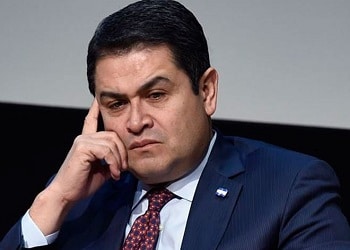The Honduran Congress has advised President Juan Orlando Hernández not to renew the mandate of the international anti-corruption mission that has helped to investigate government officials accused of stealing public funds, among them several congressmen.
The recommendation by the legislative branch raises serious doubts about the future of a mission that has facilitated investigations into political and economic elites that, until recently, were untouchable.
On December 10, the national congress voted on a 30 plus page recommendation stating that the executive branch should not renew the agreement for the creation of the Mission to Support the Fight Against Corruption and Impunity in Honduras (Misión de Apoyo Contra la Corrupción y la Impunidad en Honduras – MACCIH), citing alleged violations of rights, guarantees and constitutional principles.
With 71 votes in favor and 57 votes against the report, it was approved and sent to the office of President Juan Orlando Hernández as input for his decision regarding the future of the Mission, whose mandate expires on January 19.
SEE ALSO: Honduras News and Profile
The vote took place just days after the United States government, acting through its embassy in Tegucigalpa, requested the continuation of the MACCIH, considering that it plays a central role in ending corruption and improving governance conditions in Honduras, La Prensa reported.
Since its creation by the Organization of American States (OAS) and the Honduran government in 2016, the Mission has been responsible for investigating cases involving public and private corruption networks.
According to the Washington Office on Latin America (WOLA), at least 115 people are currently being processed through investigations led by the Mission, among them more than 70 officials from President Hernández’s government.
Due to the MACCIH’s influence and the international support it brought to Honduras, a specialized corruption unit was created within the Honduran Public Prosecutor’s Office, the Special Prosecutor’s Unit Against Impunity and Corruption (Unidad Fiscal Especial contra la Impunidad de la Corrupción – UFECIC). This unit investigates, among other things, embezzlement within the Congress and illicit campaign financing within the ruling National Party.
A Honduran prosecutor, knowledgeable of UFECIC’s work, told InSight Crime that MACCIH’s eventual departure would make the special prosecutor’s work extremely difficult.
InSight Crime Analysis
With less than a month until the MACCIH’s mandate expires, there are three possible scenarios for the future of the international oversight entity in Honduras.
In the first scenario, President Hernández could decide to extend the Mission’s mandate for another four years due to the international political cost of not doing so.
Due to the technical character of the MACCIH over the years, removed from scandals or political discussions, and its ongoing lines of investigation, the entity has managed to legitimize its mandate on an international level. This has translated, for example, into the support of the American executive branch and both Republican and Democratic congressmen in Washington.
Following an internal evaluation by the Mission that was endorsed by the US government, the OAS has also asked for MACCIH’s continuance.
However, and despite international pressures, there is another possible scenario according to contacts consulted in Tegucigalpa: that President Hernández, who has also been accused of corruption, decides to cancel the Mission using the congress’ non-renewal request to support his decision.
For this reason, governments like the United States have insisted on the Mission’s continuance, not only for its work but also as a way to keep Hernández’s administration, widely accused of corruption, in line.
SEE ALSO: Honduras Anti-Graft Body Secures Historic Conviction of Former First Lady
In this scenario, the private sector’s position would be important, which has supported the MACCIH’s continuance, Pedro Barquero, executive director of Honduras’ Chamber of Commerce and Industry of Cortés (Cámara de Comercio e Industrias de Cortés – CCIC), told the media.
The third possible scenario is a combination of the two previous scenarios: the president allows the continuance of the Mission, but with several changes to its mandate.
In order to reduce pressure on both sides, it is possible that the two influences that have closely followed MACCIH’s work in Tegucigalpa coincide, resulting in Hernández’s government extending the mandate, but for a shorter period of time and limiting its functions.
In the third scenario, especially if the time frame should be shorter than four years, many of the ongoing investigations would likely remain inconclusive, due to a lack of time and resources, the prosecutor told InSight Crime.

